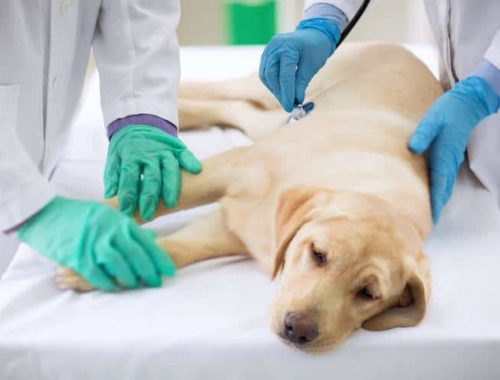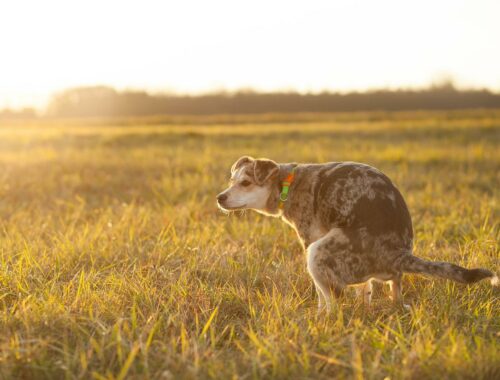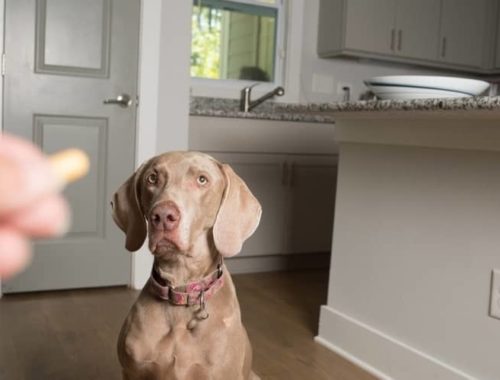Question: Why does my puppy have blood and mucus in her stool?
My new puppy Too Too has had blood and mucus in her stool, not all the time but it’s happened twice now. She’s still playful and has an appetite and drinks water. I thought worms might be the problem. Sometimes it sounds like her stomach is upset but I don’t have a lot of money and I’d really like an opinion of the seriousness of this issue before I take her to the vet and end up spending a whole lot of money. If you know what might be wrong with my puppy please help us!
–Ashley

Answer:
Dear Ashley,
Thanks for sending in your question. Congratulations on your new family member! Having a new puppy is so much fun, but health issues can make for a lot of worries.
Blood and mucus in a dog’s stool indicate irritation in the gastrointestinal tract. Usually, blood and mucus indicate a problem in the large intestine.
There are many possible causes of large intestine irritation:
1. Stress. Leaving their previous home and getting used to new people, animals, and routines can be stressful. Make sure you stick to the same routine and try not to change foods for a couple weeks after adopting a new puppy. Resist the urge to keep the puppy too busy showing her off to friends. Puppies need a lot of rest when they’re very young.
2. Change of food or treats. Abnormal stools after a food change are often temporary and will pass after a few days. If the pup is vomiting or doesn’t want to eat, don’t continue feeding the same food and see your vet.
3. Dietary indiscretion. That’s what we call it when puppies and dogs chew up and taste everything they can get their mouths on. When they eat things like plastic, paper, dirt, and rocks it can be irritating to the intestinal lining as it passes through.
4. Intestinal parasites. Hookworms, roundworms, giardia, and coccidia are common in puppies. A fecal test is the best way to identify the presence of parasites. There is not one medication that will treat all parasites, so it’s more efficient to run a fecal test than to give all possible medications.
5. Viral disease like parvoviral enteritis (parvo) and distemper. Viral diseases are common in many parts of the US. Puppies can pick up viruses from the ground or surfaces that have come in contact with a sick dog. Puppies with parvo get very sick with lethargy, vomiting, diarrhea, and poor appetite. In the case of distemper, they usually have lethargy, poor appetite, and respiratory symptoms plus or minus gastrointestinal symptoms. If you suspect your pup has a viral disease, have her checked by a veterinarian immediately.
With viruses being so rampant, it’s best not to let your pup visit public places where other dogs are allowed until she has been cleared by your vet to do so. The surest way to protect against viral diseases is to have your pup vaccinated by a veterinarian.
I know you’re worried about the cost of visiting a veterinarian, but it could save your pup’s life. Trying to treat her at home when you’re not sure what’s causing the problem can also be expensive.
Veterinarians can often get to the root of the problem quickly in cases like this, saving you time and money. Ask the vet for an estimate of costs before any services are rendered. Most vets will find a way to do the most important tests and put a hold on tests that are less likely to be helpful.
For pups with blood and mucus in their stool, I tell my clients to
- Make sure the pup isn’t eating non-food items
- Stop any treats just in case they’re causing a problem
- Watch to make sure the puppy is eating and drinking normally
- Come in for an exam, especially if symptoms last more than 24 hours or pup is not eating
- Bring in a fresh stool sample from the puppy for testing
Hope your pup is back to normal soon!
Regards,
TB Thompson, DVM
Disclaimer: Your use of the Ask The Vet feature is subject to the Ask The Vet Terms of Use.





























